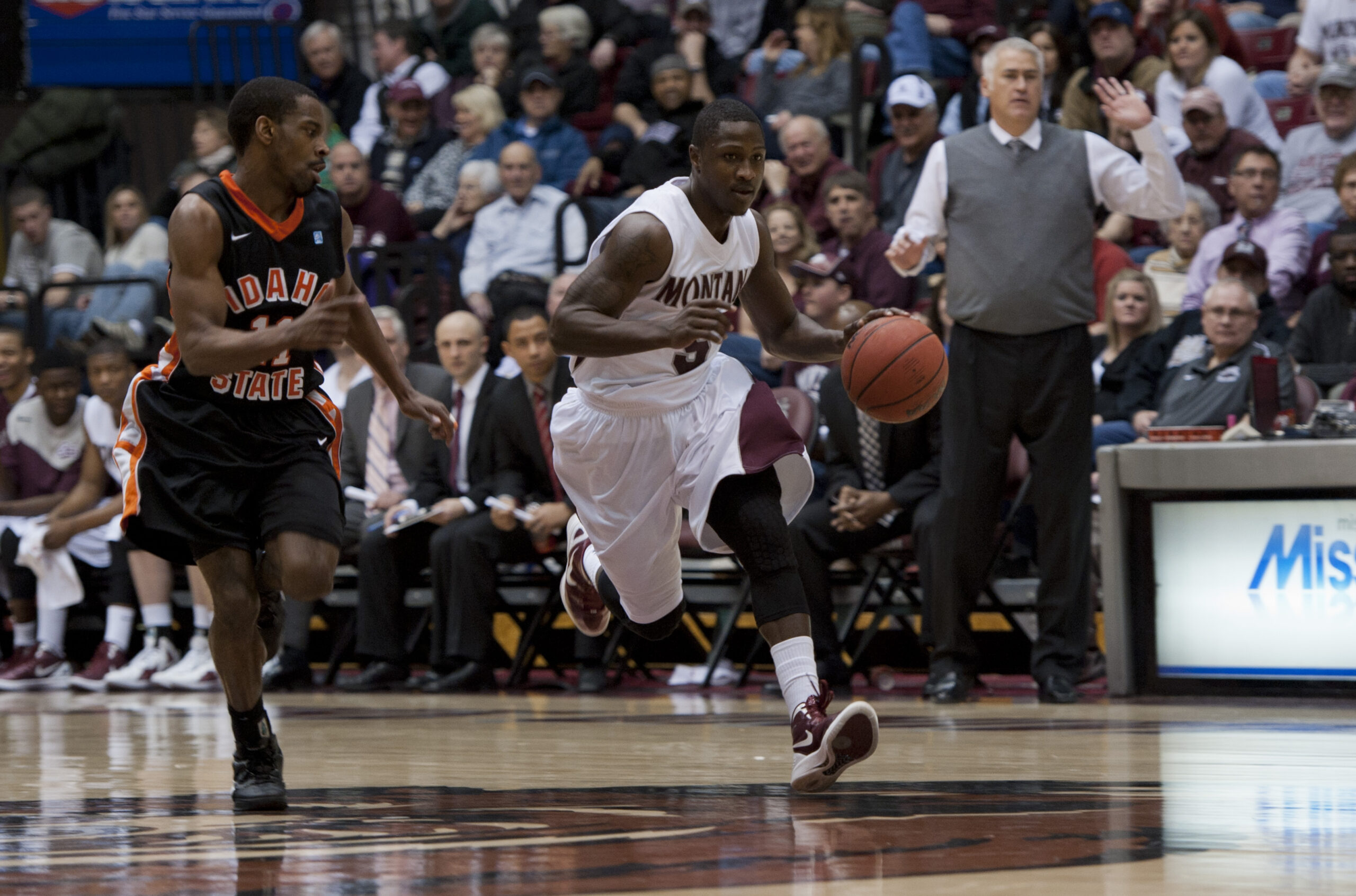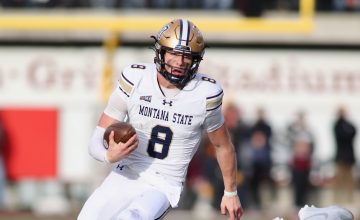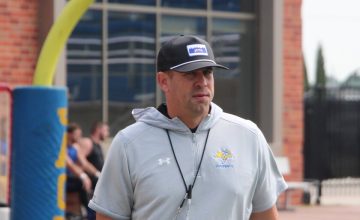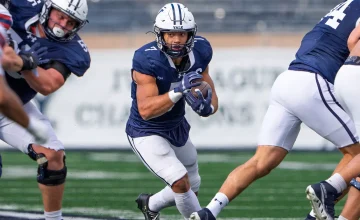THE CHARACTER
Will Cherry, the Montana point guard whose pit-bull defense, clutch shooting and cool confidence helped make the Griz, not Dame Lillard’s Weber State, the team of the early 2010s in the Big Sky. As unfair as it is to define Cherry by the negative space on another man’s resume (and as inaccurate as it would be to paint Cherry as the only contributor to those great Montana teams), it’s also true – the biggest reason seven-time NBA All-Star Damian Lillard won zero Big Sky conference championships in four years is his fellow point guard from Oakland.
THE TIMELINE

After leading McClymonds High School – the alma mater of Bill Russell and Frank Robinson, among others – to a 33-0 record, a state title and a top-10 national ranking, Cherry arrived in Missoula in 2009. The Griz were not the only school interested; according to Bob Meseroll’s immensely helpful senior profile of Cherry in the Missoulian, his high school coach had to convince him to go on a visit to Missoula.
Cherry broke into the starting lineup for the Griz 10 games into his freshman season. In the final seconds of that year’s Big Sky title game, he tied up Lillard – the Big Sky Player of the Year as a sophomore – to force a jump ball, sealing the win for Montana after Anthony Johnson’s 42 points had brought the Griz storming back in the second half. He finished the year averaging 8.3 points and 1.9 steals per game and was named honorable mention all-conference despite making just 6 of 35 3-point attempts and shooting under 55% from the free-throw line. Correcting those shooting deficiencies became a focus of Cherry’s three remaining years at Montana.
“We started from the bottom with me just literally shooting in front of the basket with one hand,” Cherry remembered. “We started gradually backing it up. … For the most part I was in that gym on the gun and I wouldn’t leave until I made 500 shots and 100 free throws. I probably shot 1,000 trying to get 500. That was when I really started honing my skills shooting, making sure it looked the same and popping my wrist and all that.”
His percentages improved to a still-dismal 22.5% from 3 and 72.9% from the free-throw line as a sophomore, and wouldn’t fall under those benchmarks for the rest of his Montana career. That year, he also finished top-10 in the conference in scoring (14.1, seventh), assists (4.3, third) and steals (2.6, first) and was named first-team all-conference, although the Griz fell to Northern Colorado in the conference title game after beating a Lillard-less Weber State in the semis.

The 2011-12 season was Cherry’s finest all-around year, as his 3-point percentage skyrocketed to 37.2% and he finished fourth in the league in scoring at 15.8 points per game, while adding 3.3 assists and once again leading the conference with 2.6 steals per game, sixth in the nation. Astonishingly for someone who could barely shoot when he arrived on campus two years earlier, he finished 10th in the conference in 3-pointers per game and 11th in free-throw percentage. In Lillard’s final Big Sky game, Cherry (13 points, six assists, three steals), Kareem Jamar (23 points, seven assists), Mathias Ward (23 points, eight rebounds) and Derek Selvig (16 points, nine rebounds) combined to run Weber State out of Dahlberg Arena in an 85-66 victory in the Big Sky title game.
Cherry missed the first third of his senior year with a foot injury but returned to post 13.3 points, 4.3 rebounds, 3.9 assists and 1.9 steals per game, although his 3-point shooting slumped back under 30 percent. In probably the finest conference race in modern history, Montana went 19-1 in Big Sky play but Weber State, despite losing Lillard to the NBA, chased the Griz all the way to the line and finished 18-2 behind Davion Berry, Scott Bamforth, Kyle Tresnak and a freshman Joel Bolomboy. The difference was Weber’s 79-74 loss at Montana State in late January and a 76-74 win by the Griz in Dahlberg two days later, with Cherry dropping 28 points, six rebounds and four steals. Although Montana dropped the reverse fixture in Ogden in February, that gave the Griz home-court advantage in the conference tournament. The Griz smacked Northern Colorado in one semifinal, while Weber State held off North Dakota 76-74 to set up a third matchup between the two in the title game.
Cherry shot just 1 of 6 in the first half, but Jamar poured in 10 points and a viciously close game was tied 34-34 at halftime. In the second half, Cherry scored a layup with 8:01 to go and then grabbed a defensive rebound on the next possession and went coast-to-coast for another bucket to give Montana a 52-50 lead with 7:30 to play. In the final minute of his home career, with Montana still defending that slim lead, Cherry hit a 3-pointer to give the Griz a 62-57 lead with 43 seconds left, then answered a Weber State 3-pointer with two ice-cold free throws to stretch the lead back out to 66-62 with 10 seconds to play. Montana won 67-64.
THE MEASURABLES
Cherry was listed at 6-1, 181 pounds as a senior.
THE LANDSCAPE

Lillard (in 2009) and Cherry (in 2010) entered the league at the Big Sky’s apex as a basketball conference. Montana had upset Nevada in the first round of the NCAA Tournament in 2005; it’s still the last March Madness win by any Big Sky team. Eastern Washington’s Rodney Stuckey had been picked 15th overall by the Detroit Pistons in 2007; Lillard would eclipse that draft position five years later, but nobody knew that yet. The conference tournament was hosted on the campus of the regular-season champion; more than 7,000 fans packed into Dahlberg Arena for Big Sky title games in Cherry’s junior and senior years.
And the Grizzlies and Wildcats were the kings of that landscape. In 2006-07, Randy Rahe and Wayne Tinkle’s first year at their respective schools, Rahe led Weber to a share of the regular-season conference title and then the tournament crown, snapping a run of two straight Montana titles under Larry Krystkowiak. When Lillard got to Ogden in 2008-09, Montana and Weber State had combined to win five of the last seven Big Sky tournament titles.
THE ACCOLADES
Three-time Big Sky tournament champion
Three-time first-team all-Big Sky
Two-time Big Sky Defensive Player of the Year
Three-time Big Sky All-Tournament team
Two-time first team NABC all-district, 2012 and 2013
QUOTABLE
“There’s only one word to describe Will Cherry, winner.” – Kareem Jamar after the 2013 Big Sky title game
“His 1,000-watt smile can light up the biggest, darkest arena. He’s brash and cocky, but not over the top, just the right proportion for the guy calling the shots from the point guard position. And saying that Cherry is a little excitable is like saying that Tiger Woods plays a little golf.” – Bob Meseroll, former Missoulian sports editor
“It’s his desire not to get scored on. It’s a personal pride thing; not everybody has it. Then add his athleticism and he has great hands and he has great anticipation skills. When he’s off the ball, he reads the offense, he reads the eyes of the guy with the ball and boom, he’s gone and in the passing lane and going the other way.” – former Montana head coach Wayne Tinkle
“You have to have a lot of pride and a lot of heart to play defense. A lot of people are offensive players, but there are very few who can play both sides of the ball. You have to take pride in both. Anybody can score 30 in a night, but can you stop another player from scoring 30, that’s the key. That’s what I was taught growing up.” – Will Cherry
APPEARANCES IN BIG SKY RECORD BOOK
Tied for fourth-most steals in a game, 9
Second in career steals, 265
Two-time conference leader in steals
Tied for most steals in a single Big Sky tournament, (9, 2010), as well as most career steals in the Big Sky tournament (24)
WHY YOU SHOULD REMEMBER

Cherry is, without a doubt, the first Big Sky athlete I personally remember. In my first semester at the University of Montana in 2012, the football team suffered through a miserable season that rather quickly dispersed the invincible aura that had built around the program since the mid-1990s. What I mean is that Montana fans, players and even opponents expected the Griz to win every game, especially at home. In practice, the effect was less corporeal and more mystical, settling on their shoulders like divine right, the grace of kings. But who could question it? In 12 years since the turn of the millennium, the Montana football team had gone 137-30 and lost a total of nine home games, with four of those nine losses coming in the FCS Playoffs. Then, in 2012, the football team went 5-6, including home losses to Northern Arizona, Southern Utah and the Cats which matched – I am not making this up – their total of three home conference losses since *1999*. Camelot was crumbling, multiple players were involved in sexual assault investigations; the next summer, Montana’s 2011 Big Sky Conference title would be officially vacated by the NCAA. Even as the 2012 season was happening, Montana fans were rushing to forget everything that year’s team and everything associated with it: scandal was forgivable, scandal and mediocrity was a mortal sin. I was no different. I remember, for example, that Trent McKinney was Montana’s quarterback in 2012 (it’s a useful touchstone for placing my exact timeline when talking to other UM alums), but I couldn’t tell you anything else about Trent McKinney.
Will Cherry was different. College freshman memories are hazy at best, but I distinctly remember Cherry, in the close heat of a mid-February conference game at Dahlberg Arena, scoring a tough bucket and then reappearing to steal the inbounds pass and lay up another two points. It was a wicked switchblade magic trick, emblematic of all the toughness and smarts and invincibility that the Griz football team had held in fans’ minds, worthy of the lightly-held mantle of arrogance that the football team had carried and then let fall. Always confident, always right, always a winner. It was a heavy weight to carry, but Will Cherry made it look easy.
WHERE ARE THEY NOW

Cherry picked up NBA shots with the Raptors and Cavaliers after graduating, playing in eight games and scoring a total of 15 points for the Cavs in 2014-15 – although, true to form, he did swipe six steals in just under 70 minutes. That would be the extent of his NBA career, although he did resurface for 46 games with Golden State’s G-League team in 2018-19.
Other than that, his career has taken place in Europe. He’s played in Lithuania, Germany, Turkey, Croatia, Greece, Italy, Israel and Romania. He’s won Lithuanian league and German cup titles, and in 2017-18 helped the Croatian club Cedevita to a treble, winning trophies in the domestic league and cup plus the Adriatic Supercup. He’s played in the EuroLeague, Europe’s top club basketball competition, twice, averaging 6.3 points over 28 total games with Zalgiris in 2014-15 and Olympiacos in 2019-20. He’s since returned to Germany, where he averaged 9.9 points, 4.6 assists and 1.6 steals last season for MHP Riesen Ludwigsburg in the German top flight.













